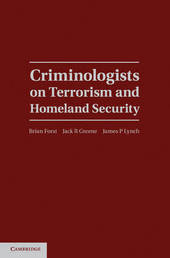
|
Criminologists on Terrorism and Homeland Security
Hardback
Main Details
| Title |
Criminologists on Terrorism and Homeland Security
|
| Authors and Contributors |
Edited by Brian Forst
|
|
Edited by Jack R. Greene
|
|
Edited by James P. Lynch
|
| Series | Cambridge Studies in Criminology |
|---|
| Physical Properties |
| Format:Hardback | | Pages:494 | | Dimensions(mm): Height 235,Width 163 |
|
| ISBN/Barcode |
9780521899451
|
| Classifications | Dewey:363.325 |
|---|
| Audience | | Professional & Vocational | |
|---|
| Illustrations |
5 Tables, unspecified; 6 Halftones, unspecified; 10 Line drawings, unspecified
|
|
Publishing Details |
| Publisher |
Cambridge University Press
|
| Imprint |
Cambridge University Press
|
| Publication Date |
7 February 2011 |
| Publication Country |
United Kingdom
|
Description
This volume presents 19 original essays addressing what is widely regarded as the most serious problem confronting America today and for years to come - terrorism - from the unique perspective of criminology. The chapters collected here address such issues as the prevention of terrorism, the applicability of community policing and routine activities models of crime to the problem of terrorism, how to balance liberty and security, and how to think about and manage the fear of terrorism, as well as the coordination of federal and local efforts to prevent and counter terrorism. Criminologists on Terrorism and Homeland Security will be of interest to anyone concerned about violence prevention in general and terrorism in particular, policing, prosecution, adjudication, sentencing and restorative justice.
Author Biography
Brian Forst joined the American University faculty after twenty years in nonprofit research, including positions such as research director at the Institute for Law and Social Research and the Police Foundation. He is the author most recently of Terrorism, Crime, and Public Policy (Cambridge University Press, 2009), After Terror (with Akbar Ahmed, 2005), Errors of Justice: Nature, Sources, and Remedies (Cambridge University Press, 2004) and The Privatization of Policing: Two Views (with Peter Manning, 1999). He is a member of the American University Senate and chairs the Department of Justice, Law, and Society's doctoral program. He is also a voting member of the Sentencing Commission for the District of Columbia. Jack R. Greene is Professor and former Dean of the College of Criminal Justice at Northeastern University, where he led academic and research programs focused on matters of criminology and justice policy (1999 to 2008). He is one of the country's leading scholars in the field of policing. Greene has published five books, the two-volume Encyclopedia of Police Science, and more than 100 research articles, book chapters, research reports and policy papers on matters of policing in the United States and internationally. Professor Greene has consulted for various agencies and organizations and is a Fellow of the Academy of Criminal Justice Sciences. James P. Lynch is Director of the Bureau of Justice Statistics, on leave from his position as Distinguished Professor at John Jay College in New York. He is the co-author of Understanding Crime Statistics (Cambridge University Press, with Lynn A. Addington), Understanding Crime Incidence Statistics: Why the UCR Diverges from the NCS (with Albert D. Biderman) and Immigration the World Over: Statutes, Policies, and Practices (with Rita J. Simon). Professor Lynch has published in many journals, including Criminology, the Journal of Quantitative Criminology and Justice Quarterly.
Reviews"Criminologists have long been interested in the processes of making laws, of breaking laws, and of reacting toward the breaking of laws. Yet, most of the time, the concern has been around street crimes, to a much lesser extent suite crimes, and to virtually no extent terrorist crimes. Fortunately, Forst, Greene, and Lynch have put together what I believe is the 'go-to' collection of original essays designed to describe terrorism, address the theoretical and policy issues surrounding it, and offer a sense of what sorts of data and questions need to be collected and asked in order for advancing theory and developing better public policy regarding terrorism. It is one thing to learn from such a set of readings, but another to be inspired by them. I have no doubt that reading this material will instill in readers the same sense of enthusiasm that is has generated for me." - Alex R. Piquero, Gordon P. Waldo Professor of Criminology, Florida State University "This is an outstanding collection of essays on terrorism by some of our leading criminologists. The essays are consistently thoughtful and solidly based in the best evidence of their respective topics. This book is the starting point serious thinking, research, and policy making regarding terrorism." - Sam Walker, School of Criminal Justice, University of Nebraska at Omaha "This collection of original chapters by some of the world's leading crime specialists sheds new light on key questions regarding terrorism: how groups form, select their targets, and hone their craft before striking; and how democratic societies can respond effectively. The authors draw upon the lessons of research on the roots of crime and the development of youth gangs and criminal cartels, and what we know about the effectiveness of sophisticated policing and criminal investigation strategies, to paint a striking new portrait of the terrorism landscape. They add richness to our understanding of dynamics terrorism in the 21st Century, and present a nuanced view of the realities of preventing its consequences." - Wesley G. Skogan, Institute for Policy Research, Northwestern University
|